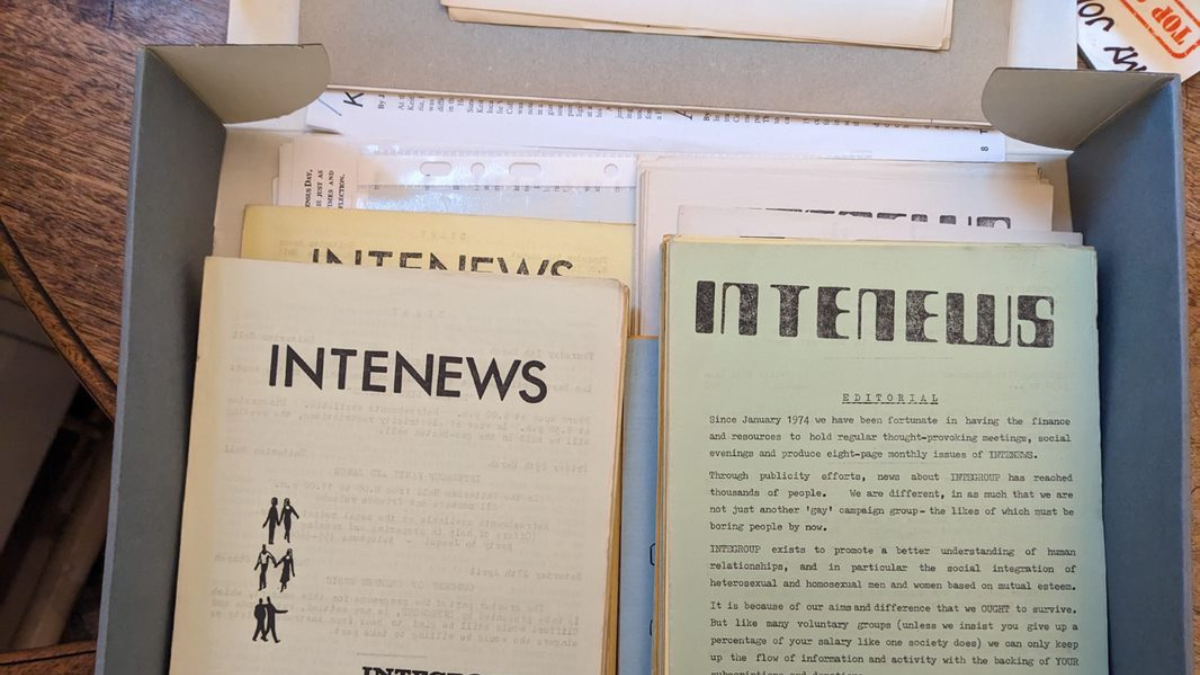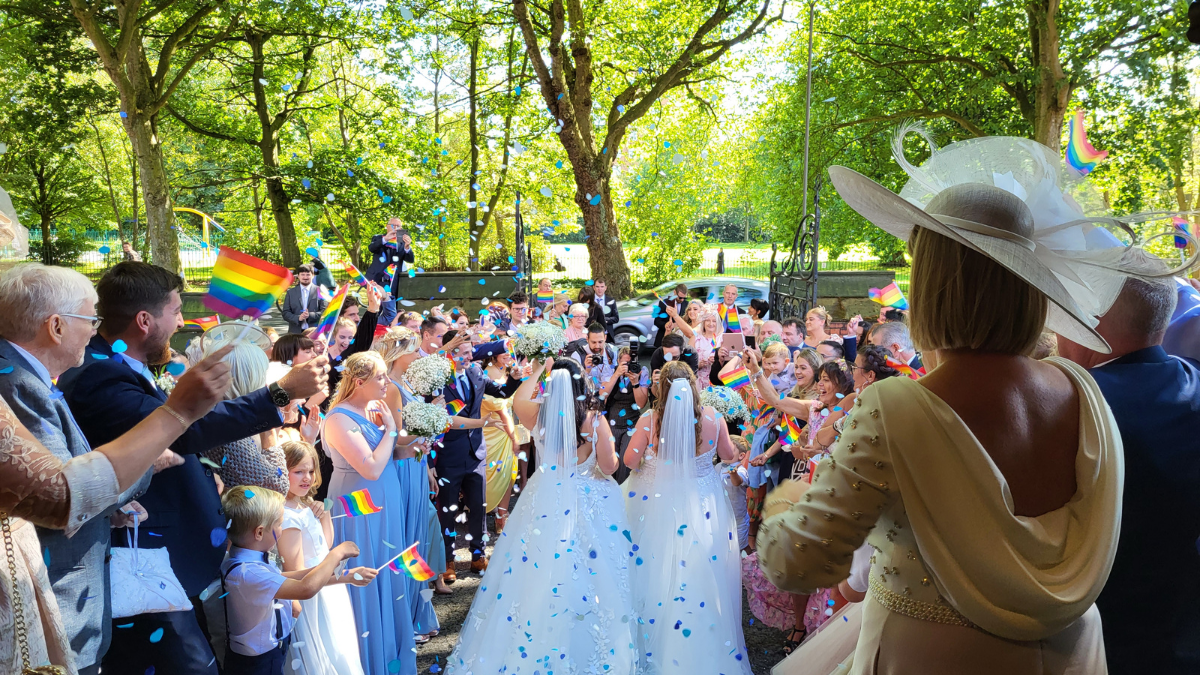LGBT+ Unitarian Voices
LGBT+ Unitarian Voices
“There have been enormous changes in the last 70 years. In the early parts of that stage, male homosexual acts were still illegal. I think in common with the rest of society, views have changed enormously. I’m proud that Unitarians have helped in that change.” – Ann Peart
This exhibition is the outcome of an exciting project exploring the brave, inspiring, and sometimes challenging experiences of LGBT+ people in the Unitarian and Free Christian denomination. The project celebrates their stories by recording, archiving, and sharing them here and online. We have carried out oral history interviews with Rev. Dr Ann Peart, Rev. Andi Phillips, Derek McAuley, and Rev. Jeff Gould. Their words are shared here, alongside documents from many of our congregations and from the archives at Essex Hall. Working with Harris Manchester College, Oxford, we have used these sources to tell the unique story of LGBT+ Unitarians and to shed light on the hidden history of their struggle for inclusion within the Unitarian movement and beyond. The project is led by two Unitarian HQ staff members, who are both trained historians: Dr Lizzie Kingston Harrison and Rev. Dr Rory Castle Jones. They have worked closely with an advisory panel made up of LGBT+ Unitarians and with Kate Alderson-Smith, Fellow Librarian at Harris Manchester College, Oxford.
“Learning from our past, celebration of our past and who we are now, lifting up LGBT+ Unitarian voices – this is something I want to get behind and endorse. It is a good and necessary thing and there is a great deal of foresight in doing this now.” (Andi Phillips, interviewed February 2023)
LGBT+ Unitarian Voices Timeline
-
Before 1967, it was illegal for men to engage in homosexual acts and society viewed homosexuality in both men and women as an illness, disorder or sin…
-
The Wolfenden Committee published a report, recommending that ‘Homosexual behaviour between consenting adults in private should no longer be a criminal offence’…
-
The General Assembly passed a resolution inviting Unitarian churches, in light of “changing moral standards”, to give their “sympathetic consideration the recent booklet ‘Towards a Quaker View of Sex’”…
-
The General Assembly’s Social Service Department published a booklet ‘Man, Woman and Child’ which called for the implementation of the Wolfenden Report’s recommendations, including decriminalisation of homosexuality…
-
The Sexual Offences Act decriminalises homosexual acts between two men, over the age of 21, in private in England and Wales…
-
One of the first grassroots church initiatives in the UK supporting LGBT+ people ‘Integroup’ is set up…
-
The Unitarian Young People’s League held an autumn convention at The Nightingale Centre, Great Hucklow, focussing on homosexuality…
-
The Gay Liberation Front organised the first Gay Pride march in Britain…
-
The General Assembly passed a resolution on ‘Homosexuality’ after considerable discussion…
-
The General Assembly was presented with a Report on Homosexuality from the study group…
-
The gay theatre company Gay Sweatshop staged their play ‘Mister X’ in Golders Green Unitarian Church…
-
The General Assembly passed a resolution on ‘Open Ministry – Gay Rights’ which confirmed Unitarian ministry was open to all regardless or sexual orientation…
-
The General Assembly produced the ‘Blue leaflet’, which included a line that “some Unitarian ministers include blessings of same-sex unions or friendships”. At the 1981 Annual Meetings, it was decided to destroy all copies of the leaflet…
-
In the 1980s, the AIDS epidemic brought illness and death with a disproportionate impact on gay men, as well as fear, hostility, discrimination and stigma…
-
The General Assembly passed a resolution on ‘Homosexuality’ in favour of the age of consent being the same for homosexuals and heterosexuals…
-
Margaret Thatcher’s Conservative government introduced Section 28 of the Local Government Act, preventing material that promoted homosexuality being available…
-
Rev. Ann Peart “came out” as a lesbian during a sermon at Golders Green Unitarian Church…
-
In 1993, a section on same-sex blessings was included in an official Unitarian book of services for the first time…
-
John Major’s Conservative government lowered the age of consent for homosexuals, but did not equalise it with heterosexuals…
-
The General Assembly produced its first leaflet for gay and lesbian people, ‘Where We Stand’, which became known as the ‘Pink Leaflet’…
-
The General Assembly passed called for repeal of the infamous Section 28 legislation that prohibited the “promotion of homosexuality” by local authorities…
-
Tony Blair’s Labour government overturned Section 28 and introduced the Civil Partnership Act and the Gender Recognition Act…
-
The General Assembly’s Sexual Orientation Equality Group produced a resource pack called ‘Celebrating Diversity’ for all congregations…
-
The General Assembly passed a resolution calling for same-sex civil partnerships in church, as a statement of equality and inclusion of same-sex couples…
-
Gordon Brown’s Labour government introduced the Equality Act…
-
Following the 2010 Equality Act making it possible to hold civil partnership ceremonies in religious buildings, in 2011 the first such ceremonies were held…
-
The General Assembly passed a resolution calling for same-sex marriage in church and campaigned for a change in the law…
-
Unitarians led the way in offering same-sex marriage ceremonies in church…
-
The General Assembly passed a resolution in support of transgender people’s rights…
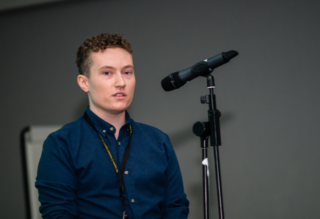
Transgender Rights (2022)
The General Assembly passed a resolution in support of transgender people’s rights. The resolution states that Unitarians “affirm with joy that each person’s understanding and statement of their own gender identity is a matter of conscience” and “affirm that transgender rights are human rights.” Further, that the General Assembly of Unitarian and Free Christian Churches “joins the British Medical Association, the Trades Union Congress and others in civil society in urging the adoption of a self-declaration model for gender recognition by the UK and devolved governments” and “requests that the Chief Officer lobby for this model in response to UK or devolved government consultations and on any other suitable occasion.”
Andi Phillips, interviewed February 2023:
“I hope we will get to a situation eventually, within Unitarianism probably before wider society, where genuinely no one bats an eyelid, that we neither need to celebrate [having a trans identity] nor commiserate about it, that we have no issues whatsoever.
I hope for welcome in the meantime, I’d love to say ‘all are welcome’ in Unitarianism and that welcome is directly made. You are welcome, we need to keep on saying that, until it doesn’t need to be said anymore, until it is abundantly obvious that it isn’t needed anymore – and we have not yet passed the criteria for the threshold on that.
The last five years have been hellish for trans people. Press coverage is overwhelmingly negative. It means that just being a positive trans person is itself an act of complete defiance of the narrative. I fear for trans people and LGBT+ people and anybody who is a visible minority. I hope we are capable of turning back, but I don’t want us to go anywhere near the cliff edge.”
Derek McAuley, interviewed February 2023:
“There is still work to be done within the Unitarian movement. Each congregation is independent and has their own flavour, and that is good – but we need to make sure that the messages that are sent out nationally about being welcoming and accepting on a whole range of issues and identities are reflected on the ground. It’s about working with people, supporting people. The ‘trans’ issue is one we need to have a conversation about, there is a lot of conflict on that. We can make a contribution towards that debate around acceptance.”
“The values of respect, equality, acknowledgement, openness underpin a free and tolerant society – where acceptance should be the basis for how we live together. This is something that Unitarians have been committed to, we can develop that going forward.”
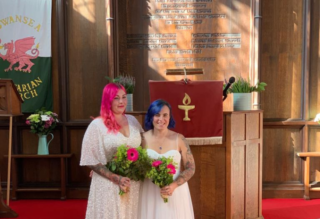
Same-Sex Marriage (2014)
The Marriage (Same Sex Couples) Bill was passed in 2013 and came into effect the following year. Introduced by David Cameron’s Conservative – Liberal Democrat coalition government, the bill allowed same-sex couples to marry and have the same rights as heterosexual couples. Thanks to the joint efforts of the Unitarians, Liberal Jews, and Quakers, the bill allowed same-sex marriages to take place in religious buildings, providing they registered separately for this. Unitarian churches began registering and in 2021, a report by York and Leeds universities showed that Unitarians were leading the way in offering same-sex marriage ceremonies in church. Click here for more information from the report.
Unitarians Campaign for Same-Sex Marriage in Church (2012)
The General Assembly passed a resolution calling for same-sex marriage in church and campaigned for a change in the law, along with allies including Liberal Judaism, Reform Judaism, and the Quakers.
Derek McAuley, interviewed February 2023:
“There were some quite offensive debates during that period, it was a bit of rollercoaster. It probably the most influential contribution that Unitarians have made to public life in Britain since the Second World War. Looking back, we as a movement, both at a very local level and also at a national level, did have an impact on that debate.
The three liberal groups, working together, played an important part in changing the narrative, that it was not religious people versus secular, that actually some people of faith were very much in favour of LGBT rights.”
“We got involved in a coalition of faith groups to support same sex marriage in religious premises – with liberal Judaism, Quakers, and the Movement for Reformed Judaism. We were small in number, but we did have an impact beyond our size.
Jeff Gould, interviewed February, 2023:
“It was an exciting experience to be involved so closely in those negotiations along with the Liberal Jews and the Society of Friends. Three religious movements that are very small numerically but have had a disproportionate, positive, influence on the lesbian and gay agenda in the country.“
We were also part of the Cutting Edge coalition, which brought together all sorts of groups to tackle faith-based homophobia and transphobia. The view was that religious freedom was not an excuse for reducing human rights.”
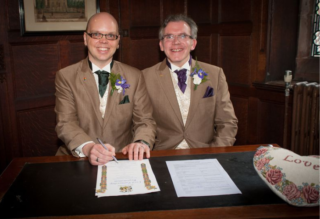
Civil Partnerships in Church (2011)
Following the 2010 Equality Act making it possible to hold civil partnership ceremonies in religious buildings, in 2011 the first such ceremonies were held. Unitarians wasted no time, with Cross Street Chapel in Manchester the first church in Britain to register for civil partnerships and Ullet Road Church in Liverpool the first to conduct a same-sex civil partnership ceremony in a church, both in 2012. Click here to read about Cross Street Chapel’s registration and Ullet Road Church’s ceremony.
Equality Act (2010)
Gordon Brown’s Labour government introduced the Equality Act, which protected people from discrimination on the basis of sex, gender reassignment, or sexual orientation in the workplace and other spheres. It also made it possible to hold civil partnership ceremonies in religious places of worship. Click here to find out more.
Unitarians Call for Civil Partnerships in Church (2008)
The General Assembly passed a resolution calling for same-sex civil partnerships in church, as a statement of equality and inclusion of same-sex couples.
Derek McAuley, interviewed February 2023:
“In 2008 the Oxford Congregation put forward a motion asking for Civil Partnerships to be performed in places of worship. To put that forward, we were pushing at the boundaries. That [resolution] was passed by the General Assembly at a time when I don’t there was any consideration nationally, within the government, that this was going to happen.”
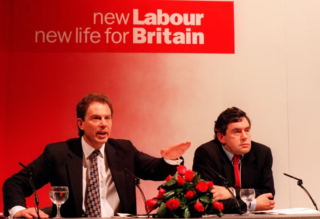
End of Section 28, Civil Partnerships and Gender Recognition (2003/04)
Tony Blair’s Labour government overturned Section 28 in 2003 and the following year introduced the Civil Partnership Act, allowing same-sex couples to have a civil partnership (similar to a marriage) for the first time. These were civil, non-religious ceremonies. The same year, the Gender Recognition Act allowed transgender people to change their legal gender.
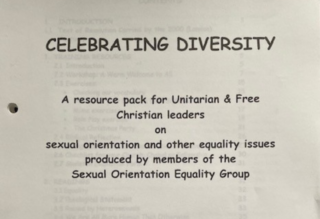
Celebrating Diversity (2003)
Following the Resolution in 2000, the General Assembly’s Sexual Orientation Equality Group produced a resource pack called ‘Celebrating Diversity’ for all congregations. It included training resources on welcoming LGBT+ people, readings, signposting to further information, personal testimonies by: Sheilah Stott on discovering that her son was gay; Rev. Jeff Gould on discrimination; and an anonymous church secretary on why LGBT+ inclusion was important to her.
Unitarians call for end to discrimination and Section 28 (2000)
The General Assembly passed a resolution on ‘Sexual Equality’ against discrimination on the grounds of sexuality, and called on the government to outlaw such discrimination, and a second resolution calling for repeal of the infamous Section 28 legislation that prohibited the “promotion of homosexuality” by local authorities.
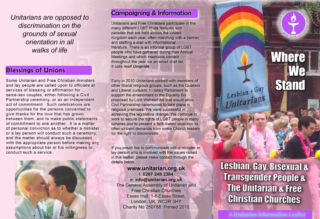
The Pink Leaflet (1996)
The General Assembly produced its first leaflet for gay and lesbian people, ‘Where We Stand’, which became known as the ‘Pink Leaflet’. The leaflet was created by Rev. Jeff Gould and Rev. Ann Peart, who gave their details so that any LGBT+ people could get in touch with them directly. Some congregations proudly displayed the leaflet, but many did not.
Jeff Gould, interviewed February 2023:
“I was very proud [of the pink leaflet]. Although… every time I stocked the literature rack with the leaflet it would disappear… so not everyone was in synch with the denominational position!”
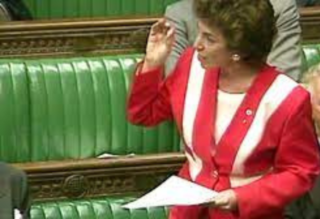
Age of Consent lowered from 21 to 18 (1994)
Ten years after Unitarians call for this change, John Major’s Conservative government lowered the age of consent for homosexuals, but did not equalise it with heterosexuals. Click here to find out more.
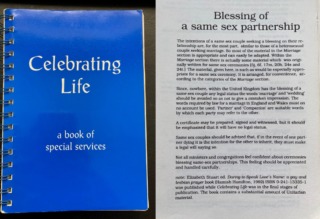
Blessing Same-Sex Couples (1992/93)
A small number of Unitarian ministers had been quietly blessing same-sex relationships for decades, in private homes, pubs, and sometimes in their churches. Sometimes these ministers had the support of their congregations, but not always.
In 1992, Roman Catholic theologian Dr. Elizabeth Stuart published ‘Daring to Speak Love’s Name: A Gay and Lesbian Prayer Book’, which included prayers and contributions from many Unitarians, including Dudley Cave and Revs. Andrew Hill, Ann Peart and A. Powell Davies.
In 1993, a section on same-sex blessings was included in an official Unitarian book of services for the first time, with Rev. Andrew Hill’s ‘Celebrating Life’, published by the General Assembly’s Lindsey Press. It was recognised with an Institute of Social Inventions Award.
Jeff Gould, interviewed February, 2023:
“Ours was the first denomination openly to bless same-sex relationships, and now of course we allow marriages to take place on chapel or church premises. So, we’ve gone from decriminalisation to full equality in the eyes of the law, and I think that has been reflected in the life of the churches. But each successive step to get us to where we are now, has been painful, and has been successfully achieved by people being very open and very persistent.”
“When I was called to a ministry in England in 1999, I was asked to pledge that I would not carry out same sex blessings in the chapel or in private homes. With regret I said I would agree to that, but I asked that we revisit the issue from time and time – and when I left after 8 and a half years, I was allowed to bless same sex relationships.“
First “out” Lesbian Minister (1989/90)
Rev. Ann Peart “came out” as a lesbian during a sermon at Golders Green Unitarian Church and her congregation were very supportive. In Spring 1990, Rev. Peart presented a paper on liberation theology at the Unitarian Minister’s Conference, in which she “came out” to her colleagues. In 1995, Ann and her partner held a celebration of their relationship at Golders Green Unitarian Church.
Ann Peart, interviewed February 2023:
“As the first woman minister, who was obviously out as a lesbian and proud of it, I felt I had a ministry just being who I was. I remember one person describing me as a very unusual sort of woman. On the whole, I found that being a minister, doing ordinary ministerial things and being known as a lesbian, helped to destroy some of the myths. It seemed to me it was important just to do my ministry as well as I could – and be a lesbian. It wasn’t a problem for me in becoming principal of a college and it certainly hasn’t damaged my career with the General Assembly. I think I’ve been really very lucky in having a career and a lot of my social life within the Unitarian movement.”
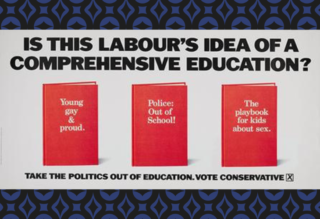
Section 28 (1988)
Margaret Thatcher’s Conservative government introduced Section 28 of the Local Government Act, preventing material that promoted homosexuality being available. A culture of fear and discrimination meant that teachers, local authorities and others were unable to teach young people about sex and sexuality. Click here to find out more.
Unitarians support equal Age of Consent (1984)
The General Assembly passed a resolution on ‘Homosexuality’ in favour of the age of consent being the same for homosexuals and heterosexuals – at this point it was 21 for homosexuals.
The AIDS Epidemic (1980s)
In the 1980s, the AIDS epidemic brought illness and death with a disproportionate impact on gay men, as well as fear, hostility, discrimination and stigma. The Unitarian Women’s League vocally supported an AIDS charity, helping Unitarians to bring discussion about AIDS into the open.
Ann Peart, interviewed February 2023:
“I did quite of lot of AIDS funerals, and it was moving to do funerals for people younger than myself. The Lesbian and Gay Bereavement project was started by Dudley Cave and Bernard Williams, with help from Keith Gilley and the Golders Green congregation. That was really significant – it was a time when, quite often, young men died from AIDS and their partners were not recognised by their families and so were excluded from their funerals. I think we did a lot of good work.”
Jeff Gould, interviewed February 2023:
“As a gay man, a lot of [AIDS – based] prejudice was projected onto me, a lot of fear from people, and it wasn’t the best time to be openly gay at Oxford even within the college – it did lead to conflict.”
“[The Lesbian and Gay Switchboard] was a wonderful portal for many people all over the country to get up to date, correct, information, without any judgement – advice on health and law and coming out. Dudley Cave was one of the pioneers, an ‘out and proud’ Unitarian and always grounded his social action in his faith.“
“It would be easy to lose sight of the fact that whilst other denominations were being very condemning and very hesitant and very negative about all the issues related to lesbian and gay issues, the general assembly was consistently progressive and advanced the cause.”
The Blue Leaflet (1980)
The General Assembly produced the ‘Blue leaflet’, which included a line that “some Unitarian ministers include blessings of same-sex unions or friendships”. At the 1981 Annual Meetings of the General Assembly, it was decided to destroy all copies of the leaflet. In response, Rev. Keith Gilley appeared on stage in a “skit” opening his coat to reveal… copies of the blue leaflet! This led to a subtle change in decision – instead of the leaflets being destroyed they were held in a back room at Unitarian headquarters and made “available on request.”
Ann Peart, interviewed February 2023:
“The Blue Leaflet does say that some ministers might be prepared to ‘consider blessing a same-sex union’. This was brought up at the General Assembly meetings and some people objected very much to this. They felt it did not show our movement in a good light. There was an acrimonious exchange, and it was agreed that the leaflet should be destroyed. A compromise was reached later when it was agreed that the leaflets would not be destroyed. They would not be on display, but they would be available to any congregation who asked for them.”
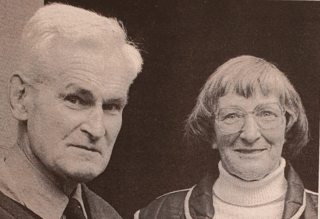
Unitarians open ministry to homosexuals (1977)
The General Assembly passed a resolution on ‘Open Ministry – Gay Rights’ which confirmed Unitarian ministry was open to all regardless of sex, race, colour or sexual orientation. The resolution was proposed by members of Golders Green church and the Unitarian Women’s League, after a gay man was turned down for ministry training on the basis of his sexuality.
During the passionate debate at the General Assembly’s Annual Meetings in 1977, prominent minister Rev. Arthur Vallance (1902-90) (pictured alonside his wife Rev. Elspeth Vallance) – a married man with children – stood up and outed himself, demonstrating to the delegates that homosexuals were already among them, serving as their ministers. After the debate, several other prominent Unitarians also “came out” as gay.
The same year, a second resolution on ‘Homosexuality’ declared: “abhorrence of discrimination solely on the basis of sexual orientation” and pledged to “to bring liberalising pressures to bear on those public bodies where discrimination against the homosexual still persists”.
Ann Peart, interviewed February 2023:
“There were two resolutions on homosexuality that year (1977), one a general one asking for a more liberal approach and the other one was specifically directed to the ministry. It asked that our ministry be open to people regardless of sex, race, or sexual orientation. The resolution was proposed by Golders Green. It was the espousal of the cause by the Women’s League which helped enormously. I have vague memories of a late-night meeting to discuss some of the issues, two retired male ministers came out as gay and had a very sympathetic reception on the whole. The resolution was passed unanimously, and although there was some hostility – letters to The Inquirer and so on – it became firm Unitarian General Assembly policy.”
Jeff Gould, interviewed February 2023:
“We were the first denomination in this country to openly welcome people who were gay or lesbian to train for our ministry, I think that’s a huge point of honour that we should always remember. I had done a great deal of research to find out where different denominations stand on homosexuality because I didn’t want to get into a situation where I would have to lie or to conceal something about myself and then have to leave. I found out that there had been a series of motions passed at the Annual Meetings. The most important was probably in 1977, saying that the General Assembly affirmed the welcoming of students to the ministry who were openly gay and lesbian, that there was no bar to people being trained on the basis of their sexual orientation. I found it amazing, extremely welcoming, I didn’t feel that there was any barrier – but still I never said the word, I just spoke very honestly about my background.”
Derek McAuley, interviewed February, 2023:
“We need to have an awareness of the struggles within our movement, with the General Assembly on several occasions addressing the issue of LGBT rights and equality. One can look back through the series of resolutions, on gradual acceptance both opening ministry to people regardless of their background or identity, expressing our abhorrence at discrimination against individuals on the basis of sexual orientation – which drew on long standing Unitarian/ Free Christian views on equality – and then an acceptance of an equal age of consent in 1984, wanting the repeal of clause 28 of the Local Government Act and then calling for the equal acceptance of gay people in all walks of life.
That stream of [GA] resolutions over time was very radical if you compare that to the mainstream Christian denominations and other faith groups.
If one looks back at those struggles, those [GA] resolutions were not passed without a lot of detailed argument – having to convince the movement that LGBT rights are totally within the mainstream Unitarian views and entirely in line with those. If you go back to the 1960s you can find the traces – where Unitarian ministers were talking about the possibility of acceptance of LGBT relationships. In the 70s, the blessings by a few – not many- ministers of gay relationships.
We have to remember the pioneers like Keith Gilley and Dudley Cave and others within Golders Green. Compare that to the situation today where right across the movement LGBT people are accepted in the main.”
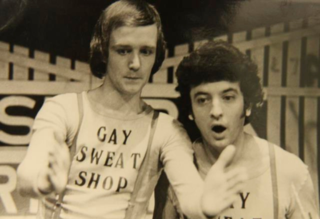
Gay Sweatshop (1975)
The gay theatre company Gay Sweatshop staged their play ‘Mister X’ in Golders Green Unitarian Church, with the approval of the minister, Rev. Keith Gilley. The opening scene was interrupted by a local vicar, his wife and friends, who shouted at the actors for twenty minutes, waving signs with messages including ‘Man Shall Not Lie With Man’. The incident was reported in the local press, with headlines like ‘Vicar in Gay Play Rumpus’.
The press reported Mrs Olive Thompson, Chairman of Golders Green, Unitarian Church, as saying: “A church should care about people, all people, irrespective of sex, age, race, sexual orientation, religious tradition or any other unimportant difference. Airing the concerns of a minority group is a very proper church function. Far too many people regard churches as ‘Thou shalt not’ places. That’s not a role for our congregation, we intend to remain a focus of genuine concern and a centre of liberal thought.” Click here to find out more.
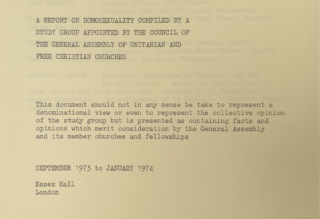
Report on Homosexuality (1974)
The General Assembly was presented with a Report on Homosexuality from the study group.
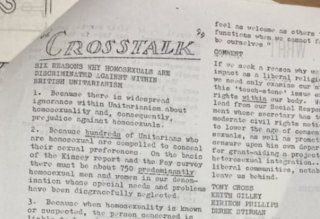
Moving Towards Inclusion (1973)
The General Assembly passed a resolution on ‘Homosexuality’ after considerable discussion, setting up a ‘study group’ to examine the question.
The same year, Rev. Glyn J. Pruce (1928-2015) in a lecture at Manchester College, Oxford on “Love, Marriage and the Family” convened by the General Assembly’s Department of Social Responsibility, called for homosexual relationships to be given legal and social sanction, like heterosexual marriage.
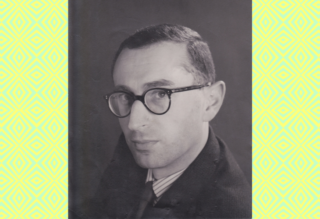
Unitarian Youth Focus on Homosexuality (1972)
The Unitarian Young People’s League held an autumn convention at The Nightingale Centre, Great Hucklow, focussing on homosexuality. They invited two guest speakers, Anthony Grey (Trustee of the Albany Trust and Chairman of the National Federation of Homophile Organisations) (pictured above) and Stephen Etherington (Campaign for Homosexual Equality and the Gay Liberation Front).
One attendee remembered that “even those…who were strongly prejudiced found they were looking at the subject in a somewhat different way” and that by the end “they all came to the same conclusion. That homosexuals were unfairly prejudiced against, and the main reason…is that the general public have not been informed enough.” The Young People’s League agreed to raise the subject at the next General Assembly.
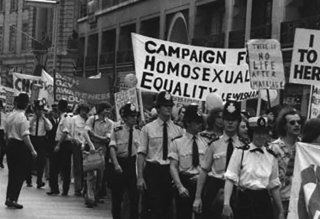
First Gay Pride March (1972)
The Gay Liberation Front organised the first Gay Pride march in Britain. Click here to find out more.
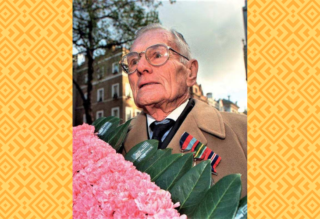
Integroup (1970)
One of the first grassroots church initiatives in the UK supporting LGBT+ people ‘Integroup’, led by Dudley Cave(pictured above), is set up at Lewisham Unitarian Church by Rev. Dr. Tony Cross, and also at Golders Green Unitarian Church by Rev. Keith Gilley, who began conducting bless same-sex blessing ceremonies in the 1970s.
Carol Steele has recently written that Rev Keith Gilley was the first clergyman to accept her as a woman in “Trans Britain: Our Journey from the Shadows”. From ‘Integroup’ emerged the 1974 Lesbian and Gay Switchboard and the Lesbian and Gay Bereavement Project. Unitarian headquarters at Essex Hall hosted training for the latter. Click here to read Rev. Keith Gilley’s obituary.
Dudley Cave (1921-1999) fought in the Second World War and suffered as a Japanese prisoner of war, nearly dying of starvation in Singapore. Liberated in 1945 and returning home, he was dismayed by the continuing persecution of homosexuals like himself. In 1954, he met his life-partner Bernard Williams. In 1971, Dudley became a Unitarian and was pioneer of the campaign for LGBT+ inclusion in the Unitarian denomination during the 1970s. He was a co-founder of the Gay Switchboard, the LGBT+ helpline, in 1974, and remained a phone volunteer until his death in 1999. Dudley also set up in 1980 the Lesbian and Gay Bereavement Project. In his later years, he campaigned for recognition of the role of LGBT+ soldiers like himself in the war. Click here to read Dudley Cave’s obituary, by Peter Tatchell.
Ann Peart, interviewed February, 2023
“Integroup was a meeting of both gay and straight people, to discuss matters of mutual interest on a basis of equality. Nobody was asked their orientation. It was the place where I first knowingly met gay men and lesbians.”
Jeff Gould, interviewed February, 2023:
“The intention was to get heterosexual people and homosexual people together, in one room, to talk, and have direct experience of each other. This was radical thinking – and action – back then.“
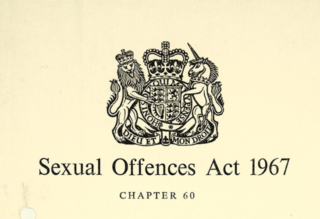
Decriminalisation (1967)
The Sexual Offences Act decriminalises homosexual acts between two men, over the age of 21, in private in England and Wales. Click here to find out more.
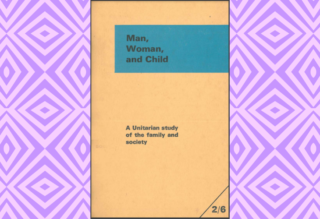
Unitarians support decriminalisation (1964)
The General Assembly’s Social Service Department published a booklet ‘Man, Woman and Child’ which called for the implementation of the Wolfenden Report’s recommendations, including decriminalisation of homosexuality. Click to here to read the booklet.
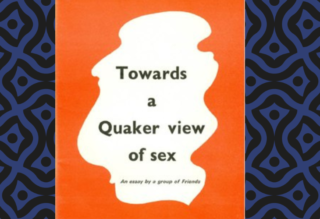
Towards a Quaker view of sex? (1963)
The General Assembly passed a resolution inviting Unitarian churches, in light of “changing moral standards”, to give their “sympathetic consideration the recent booklet ‘Towards a Quaker View of Sex’”. This booklet blamed “fear and ignorance” for society’s views on homosexuality and called for a more liberal, tolerant approach. Click here to find out more.
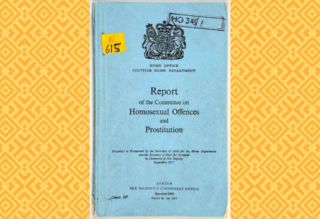
The Wolfenden Report (1957)
The Wolfenden Committee published a report, recommending that ‘Homosexual behaviour between consenting adults in private should no longer be a criminal offence.’ This applied to adults over the age of 21, except in the armed forces. Click here to find out more.
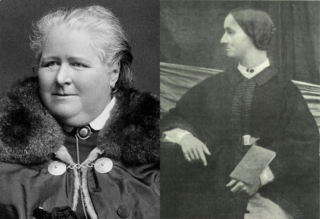
Underground LGBT+ (Pre-1960s)
Before 1967, it was illegal for men to engage in homosexual acts and society viewed homosexuality in both men and women as an illness, disorder or sin. Queer people had to suppress their sexuality and identity, forming underground subcultures and living in fear. Whilst many Unitarians shared the suspicions and prejudices of wider society, some individual Unitarians called for tolerance and emancipation of LGBT+ people and others lived with same-sex partners. For example Frances Power Cobbe was a Unitarian who lived with her female partner, the Welsh sculptor Mary Lloyd. Click here to find out more about them.
More info about the project
SEND US YOUR lgbt+ uNITARIAN STORIES
Do you have any photographs, leaflets, posters, banners, newspaper stories, documents, or any other items that help shed light on our movement’s LGBT+ story? We are also interested in including written reminiscences and we invite you to send those stories to us. Click here for more information and for the Archive Donation Form.
pop-up exhibition
After the project launch at the General Assembly of Unitarian & Free Christian Churches’ Annual Meetings in April 2023, a pop-up exhibition will be on display at Essex Hall (Unitarian HQ in London), Harris Manchester College Oxford, and then around the UK. If you would like the pop-up exhibition to appear in your church, community space, or other venue, please get in touch!
INTERVIEWEES
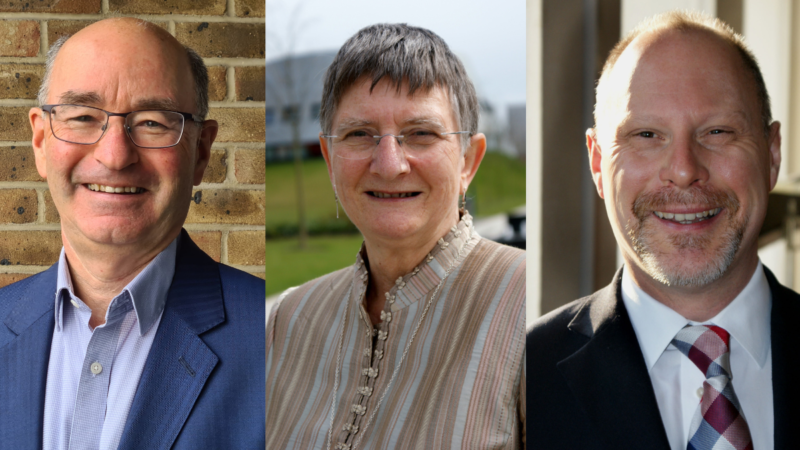
Derek McAuley was born in Northern Ireland, before moving to England and later becoming a Unitarian at Cross Street Chapel, Manchester. Derek served as Chief Officer of the General Assembly of Unitarian and Free Christian Churches from 2009 To 2019, the first “out” LGBT+ person to hold such a senior leadership position in the denomination. Watch Derek’s interview in full here.
Rev. Dr Ann Peart is the first openly lesbian Unitarian Minister in the UK, former principal of Unitarian College Manchester, former Information
Officer at Unitarian HQ, former President of the General Assembly and Honorary member of the General Assembly. Watch Ann’s interview in full here.
Rev. Jeff Gould comes originally from Massachusetts, USA, and trained for the Unitarian ministry at Oxford, before serving congregations in Liverpool, Lancashire and Cheshire. He is currently minister to Dean Row and Hale Barns Unitarian chapels. As an “out” gay minister, Jeff has been greatly involved in the movement towards LGBT+ inclusion within the Unitarian movement since the 1980s. Watch Jeff’s interview in full here.
Rev. Andi Phillips is minister of Upper Chapel, Sheffield.
project leaders
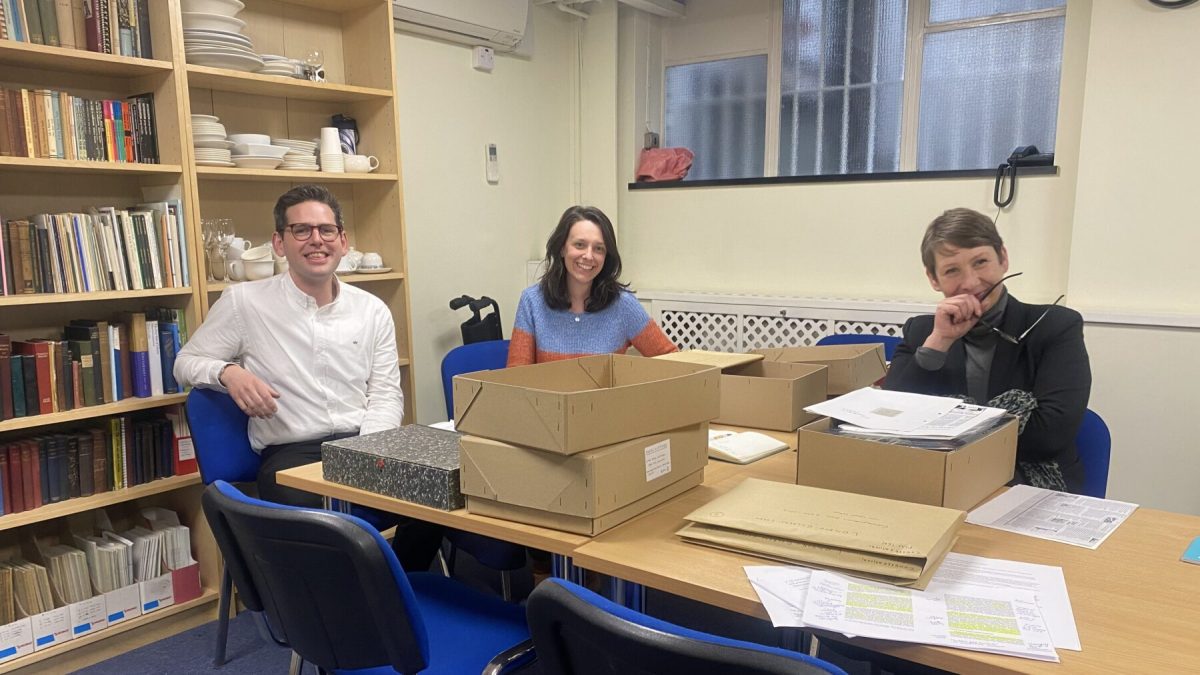
The project is led by two Unitarian HQ staff members, who are both trained historians. They are supported by an advisory panel made up of LGBT+ Unitarians and have been working with Kate Alderson-Smith from Harris Manchester College Oxford.
DR. LIZZIE KINGSTON-HARRISON
Lizzie earned her doctorate from the University of Sussex in 2010 with a thesis on the Unitarian radical Joseph Priestley. After a career in teaching, she joined the Unitarian HQ team in October 2021 as our Congregational Connections Lead. Lizzie grew up in Norwich and now lives in Suffolk with her husband and daughters. The beautiful coastal countryside and the grounded and welcoming community at Framlingham Unitarian Meeting House helped her to find a spiritual home. Contact Lizzie.
REV. DR. RORY CASTLE JONES
Like Lizzie, Rory left a career in education to work for the Unitarians. After earning his doctorate from Swansea University with a thesis on the radical thinker Rosa Luxemburg in 2016, he joined Unitarian HQ as our part-time Communications Officer in 2018 and completed his ministry training in 2021, beginning a ministry at Gellionnen Chapel near Swansea the same year. He lives in the Swansea Valley with his husband and their two dogs. Contact Rory.
